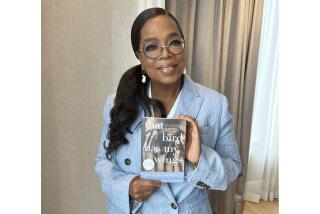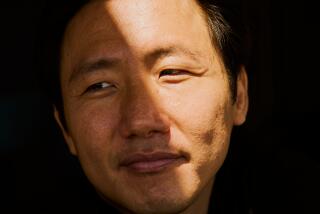Behind closed doors at ‘Masters of Sex’
- Share via
Disrobing for the cameras may not be easy at first, but after a while it can acquire a certain workaday familiarity. “Now I don’t even get nervous about it,” Lizzy Caplan said after a day of shooting on the Sony lot in Culver City.
Such anxiety could be an occupational hazard on “Masters of Sex,” the upcoming Showtime series in which the 31-year-old actress plays Virginia Johnson, half of the most famous sex research team of the 20th century, Masters and Johnson.
“Masters” tells the story of the intertwined careers and personal lives of Johnson and her collaborator, fertility expert William Masters (played by British actor Michael Sheen, best-known for his work as Tony Blair in “The Queen”). Together, they began studying human sexual behavior in St. Louis in the late 1950s, when the subject was taboo in mixed company and sex therapy was virtually nonexistent. Some of the supposed sexual wisdom they ended up overturning dated from Victorian times. (On the other hand, some of their theories — including the idea that gays could be “converted” to heterosexuality — have since been discredited.)
FULL COVERAGE: FALL TV Preview 2013
Masters and Johnson’s work depended not on surveys and polls, à la Alfred Kinsey, but rather direct observation of couples mating — a radical idea at the time. “Masters” also explores the growing intimacy between the two researchers, who had an affair and eventually married. That gives the series an eye-popping amount of nudity and sexual situations even by the liberal standards of premium cable, where shows such as HBO’s “Game of Thrones” have already raised the bar. Caplan got used to it but understands the subject matter still provokes anxiety.
“We have [actors] who show up for one day and have to get naked and we wire them up and they masturbate in front of me and Michael Sheen,” Caplan said. “And those people are ridiculously brave.”
But the real question prompted by “Masters” isn’t whether audiences can handle the groping, ogling and naughty bits. The generous amounts of flesh on display elsewhere on TV prove they’re fine with it, thank you.
Instead, “Masters,” which begins Sept. 29, wrangles with a more problematic issue: Can a weekly series be fashioned by retelling a true story that unfolded over decades of scientific research, not all of it particularly sexy? This is not “Lost” or “Breaking Bad” or “CSI: Crime Scene Investigation” — or even “The Borgias,” where history intersects with legend. This isn’t a crime show or a disease-of-the-week. Liberties can be taken, but the facts are what they are.
The issue has weighed on Michelle Ashford, the executive producer of “Masters,” which is based on the nonfiction book of the same title by Thomas Maier.
“We don’t really have a template for basing an actual series on a nonfiction story,” she said. “It is curious. When I looked at the book I thought, This looks like about four seasons’ worth of material.”
Over time, however, she’s come to see “Masters” as more like a traditional hospital show than she realized — a very sexy version of “ER,” if you will.
INTERACTIVE: Fall 2013 TV preview
“This is kind of a franchise show,” she said. “They’re in medicine and they’re scientists.”
What goes unseen
Masters makes an unlikely inspiration for a TV character. A gynecologist by trade, he was a brilliant but emotionally blocked man, bent on winning a Nobel Prize but not quite sure how to get there. ( Although international renown eventually came his way, the Nobel did not.)
“When I was first asked if I wanted to do the show at all, I had a number of concerns, one of which was the nature of the character, which was very different than the characters I’d played before,” Sheen said during a break in filming in May, clad in a handsome silk bathrobe and slippers of the sort Hugh Hefner might have worn for one of his 1950s-vintage Playboy pajama parties. He was about to shoot a domestic scene with Caitlin FitzGerald, who plays Masters’ wife Libby — whom he eventually left for Johnson.
Sheen decided, though, that “someone who’s got so much going on underneath — and so little going on on top — is probably the most interesting character to play.”
Sheen, a classically trained British actor, has played former Prime Minister Blair three times, most famously in “The Queen,” and won plaudits for his cagey performance as presidential interrogator David Frost in the feature “Frost/Nixon.” But at least in the Showtime version, Masters was something else entirely: A cold, aloof scientist who gave very little away emotionally.
The real Masters — who died in 2001 — was also physically imposing, with a bald head and a heavy, unnerving stare. Ashford thought that in photos he looked like a guard at Buchenwald. Sheen initially considered shaving his head for the role, but producers decided against it.
PHOTOS: Hollywood Backlot moments
According to “Masters,” sex research was its title character’s bid for a larger human connection.
“He was a remarkably cutoff person,” Ashford said. “He didn’t know how to access emotion and he didn’t know how to access intimacy. And I think he thought sex somehow had the answer. He was very confused about all these deep and repressed feelings. He thought: Sex — somehow, if I could understand that, I could feel close to someone.”
Johnson was in many ways a perfect partner — professionally, if not necessarily personally. Possessing what might once have been called a free spirit, she already had two (possibly three) ex-husbands and a busted career as a nightclub singer by the time she showed up in Masters’ lab looking for work. What she didn’t have was any scientific training.
However, she was able to connect with patients in a way that Masters could not, empathizing with their struggles and persuading them to become sexual guinea pigs. In “Masters,” she’s portrayed as a woman far ahead of her time.
“Virginia Johnson looked like every other woman around her,” Caplan told reporters this summer during a promotional event in Beverly Hills. “It’s the choices she’s made, what’s inside her, that’s different.”
The role could mark a turning point for Caplan, who until now has been known mainly for comedic turns in fare such as the high-school satire “Mean Girls” and TV’s offbeat “Party Down.”
“I’m not used to getting parts like this — at all,” she said. “I’m not considered a dramatic actress by many people.”
What the role didn’t win Caplan — despite her repeated requests — was an audience with Johnson herself. The retired sex researcher, who was interviewed extensively by Maier for his book, decided to draw the line at participating in a TV dramatization of her life and career. She died earlier this year at 88.
‘Such a crazy story’
Showtime executives know that for many viewers sex will function as the lure for “Masters.” That certainly hasn’t hurt the marketing efforts, which depict Masters and Johnson as responsible for everything from the sexual revolution to Madonna.
Showtime entertainment president David Nevins said the TV series started on a long plane trip, when an old friend, producer Sarah Timberman, flagged him down. “She walked over to me and said, ‘You have to read this book,’” he recalled. Into his lap was dumped a copy of Maier’s “Masters of Sex.”
“It’s such a crazy story,” Nevins added, who finished the book on the flight. “When you’re in pay cable, you have too many stories about sex and the sex trade. But they had such a crazy, fascinating relationship.”
By the end of the flight, Nevins said, he wanted to do a show.
For the producers it’s that relationship that’s key — the sex is merely incidental.
“It’s the story of these two fragmented people who had so many missing pieces in their lives who found one another,” Ashford said. But “as the relationship progresses the thing that draws them together turns out to be the thing that would erode it. So it’s a very curious examination of a complicated relationship between two very damaged people.”
But all of that damage and complication played out in an atmosphere of heavy breathing, both in the lab and in the bedroom. Plenty of screen time is afforded for that.
“Every episode [where] I’ve had to do nudity, I think they’ve taken it as far as they possibly could take it in terms of my own discomfort,” Caplan recalled with a smile. “And then I read the next thing and it’s, like, Oh, that’s worse. That’s definitely worse.”
More to Read
The complete guide to home viewing
Get Screen Gab for everything about the TV shows and streaming movies everyone’s talking about.
You may occasionally receive promotional content from the Los Angeles Times.







